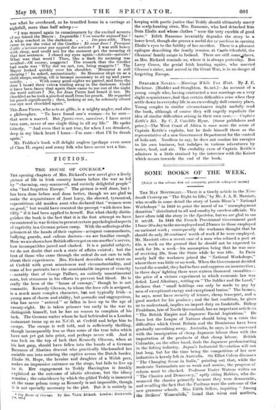FICTION.
THE HOUSE OF COURAGE.• THE opening chapters of MM. Richard's new novel give a lively picture of life in Irish country houses before the war as led by "charming, easy-mannered, and entirely delightful people" who "had forgotten Europe." The picture is well done, but C. has been done before and done better, though we are glad to make the acquaintance of Aunt Lucy, the shrewd, tyrannical, superstitious old maiden aunt who declared that "women were no good," but would have resented the precept "with fierce hos- tility" if it had been applied to herself. But what chiefly distin- guishes the book is the fact that it is the first attempt we have encountered in war fiction to present certain psychological aspects of captivity in a German prison camp. With the sufferings of the prisoners at the hands of their captors—arrogant commandants, bullying guards, and callous doctors—we are familiar enough. Here we are shown how British officers got on one another's nerves, how incompatibles jarred and clashed. It is a painful subject; we do not doubt that such a state of affairs existed ; but the best of those who came through the ordeal do not care to talk about their experiences. Mrs. Rickard describes what went on at Crefeld with great minuteness and circumstantiality, and some of her portraits have the unmistakable impress of veracity —notably that of George Palliser, an entirely unsentimental man, but strenuous in his efforts to prevent bad blood. He is really the hero of the " house of courage," though he is not romantic. Kennedy Gleeson, to whom the beau role is assigned, is a much more complex character, but not typically Irish—a young man of charm and ability, but nomadic and ungregarious, who has never " arrived " or fallen in love up to the age of twenty-eight. He is taken prisoner too early in the war to distinguish himself, but he has no reason to complain of his luck. The German waiter whom he had befriended in a London restaurant turns up as an N.C.O. at Crefeld and helps him to escape. The escape is well told, and is sufficiently thrilling, though incomparably less so than some of the true tales which have not yet got into print, and perhaps never will. And it was luck on the top of luck that Kennedy Gleoson, when at his last gasp, should have fallen into the hands of a German Baroness of Alsatian descent who practically blackmailed her amiable son into assisting the captive across the Dutch border, Elodie St. Hope, the heroine and daughter of a Welsh peer, makes an impressive entrance on the stage, but fails to live up to it. Her engagement to Teddy Harrington is frankly explained as the outcome of idiotic altruism, but the idiocy remains ; the coincidence by which the gilded Teddy is immured at the same prison camp as Kennedy is not impossible, though it is not specially necessary to the plot. But it is entirely in • The House of Courage. By Net Victor Rickard. Loudon: Duckworth. Ua art] keeping with poetic justice that Teddy should ultimately marry the scalp-hunting siren, Mts. Ransome, who had detached hint from Elodic and whose clothes " were the very exeelsis of good taste." Edith Ransome invariably degrades the story to a lower level, though she proves a useful des ex madina in opening Elodie's eyes to the futility of her sacrifice. There is a pleasant epilogue describing the family reunion at Castle Glenfield, the Glcesons' family estate in Ireland. There are still somesplaces. as Mrs. Rickard reminds us, where it is always yesterday. But Larry Grove, the genial Irish hunting squire. who married Gleeson's sister, and served in the Great War, is in no danger of forgetting Europe.






































 Previous page
Previous page